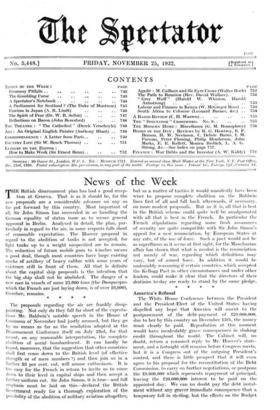The proposals regarding the air are frankly disap- pointing. Not
only do they fall far short of the expecta- tions Mr. Baldwin's notable speech in the House of Commons of November had justly aroused, but they go by no means as far as the resolution adopted at the Disarmament Conference itself on July 23rd, for that meant, on any reasonable interpretation, the complete abolition of aerial bombardment. It can hardly be hoped, moreover, that the suggestion that other countries shall first come down to the British level (of effective strength or of mere numbers ?) and then join us in a further 33 per cent. cut, will arouse enthusiasm. It is too easy for the French in return to invite us to come down to their level in capital ships and then accept a further uniform cut. -Sir John Simon, it is true—and full emphasis must be laid on this—declared the British . Government ready for a thorough exploration of the possibility of the abolition of military aviation altogether, but as a matter of tactics it would manifestly have been wiser to propose complete abolition on the Baldwin lines first of all and fall back afterwards, if necessary, on more modest proposals. But as it is, all that is best in the British scheme could quite well be amalgamated with all that is best in the French. In particular the French stipulations regarding some fresh assurances of security arc quite compatible with Sir John Simon's appeal for a new renunciation, by European States at any rate, of the use of force. Such a pact would not be as superfluous as it seems at first sight, for the Manchurian affair has shown that what is needed is the renunciation not merely of war, regarding which definitions may vary, but of armed force. In addition it would be undeniably reassuring if certain countries, which accepted the Kellogg Pact in other circumstances and under other leaders, *could make it clear that the directors of their destinies to-day are ready to stand by the same pledge.






































